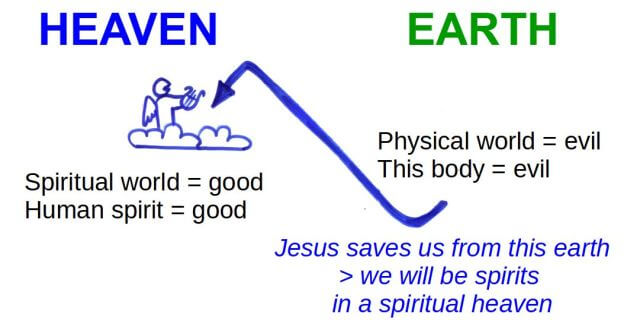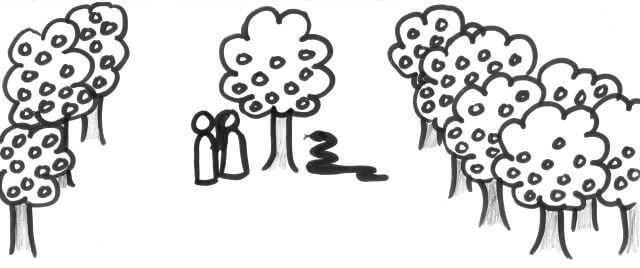SCI 09 – HEAVEN & EARTH
Introduction
- Ge 1:1 … “In the beginning God created the heavens and the earth”
- Heaven and earth, so simple, and yet many believers have a muddle in their thinking about this.
- For example: What exactly does ‘earth’ mean? Or more difficult: what exactly does ‘heaven’ mean? What do the often used terms ‘earthly’, ‘worldly’, ‘spiritual’ or ‘heavenly’ mean? Does earth mean physical reality? Does heaven then also mean physical reality? Or rather metaphysical reality? Spiritual reality?
- And thinking about us humans: What are we part of? Earth? Heaven? Physical reality? Spiritual reality? All of it? What do the terms ‘flesh’, ‘body’, ‘spirit’ mean?
- When sin enters the scene, what exactly happens then to heaven? And to earth? And to humans?
The plot as we perceive it
- Often Christians believe: ‘spiritual world = good’ and ‘physical world / body = evil’.
- We say things like: ‘we should not be worldly, but spiritual’ … ‘this body only brings me into temptation’ … ‘the physical world is doomed anyway’ … ‘we will go to heaven, as spirits into a spiritual heaven’ … ‘Jesus comes back and will rapture us away from the physical world’ … ‘working for this world is worldly’ … ‘only ‘spiritual vocations are spiritual’
- Why worry about earth? About physical reality at all? Is it not the flesh, the physical, that is sinful? Is the earth not simply a temporary reality, an abortive start, a place which is only still important because we still find ourselves here?
- And so it seems: Ro 8:3 … “for God has done what the law, weakened by the flesh, could not do … he condemned sin in the flesh”
- Is it not this wretched body of death what Jesus has rescued us from? Ro 7:24 … Wretched man that I am, who will rescue me from this body of death?
- Is this not the world that we are not of (Jn 17:16)?
- Is it not earthly matters we shouldn’t pursue? Lu 12:29-30 … “do not keep striving for what you are to eat, drink”
- Is Jesus not rescuing us from this doomed earth to take us to heaven by rapture? (1 Th 4:16-17 … “The Lord himself, with a cry of command … will descend from heaven … we will be caught up in the clouds together to meet the Lord in the air”)
- Will the earth not be destroyed by God himself? 2 Pe 3:10 … “the elements will be dissolved with fire, and the earth and everything that is done on it will be burned up”
- If you are a normal evangelical or charismatic church-goer, you will typically think roughly like this:
- “God made heaven and earth, but then sin entered the world it went bad. Then thankfully Jesus came and saved us and left the Holy Spirit so we now can be living a spiritual life, though we still have a body that gets us into trouble. But once Jesus comes back (the sooner the better) he will take our spirits away from this evil and doomed earth into heaven by the rapture, where we will be spirits in a spiritual heaven. The only important issue is ‘being saved’, which will guarantee you that you make it to heaven.”
- This all seems pretty clear to us. But then the problem is, that you occasionally we stumble across other Scriptures, which tend to ‘muddle’ our ‘clear plot’:

Problems with our ‘clear’ plot
- Some problems seem rather harmless, like the frequently mentioned ‘birds of heaven’ in the Bible. Well, at least the birds made it to heaven! I don’t think anyone is objecting to birds.
- Then there are the ‘stars of heaven’. If the stars are in heaven, where is God? On the other side of the stars? Will then going to the moon and telescopes viewing the universe prove or disprove the existence of God?
- It is accepted truth, that God is in heaven. Good. But how come Satan, already evil, is present in heaven in Job 1:6-7?
- Maybe he wasn’t thrown out of heaven yet? Until Jesus mentions he saw Satan fall from heaven (Lu 10:18)? But what then is he doing back in heaven in Re 12:7-8?
- If the physical world is bad, why then did God make it? And declare it ‘very good’ (Ge 1:31)? And keeps giving life and existence to it?
- If this body is only a temptation, why did God create it in the first place?
- If this body leads us to sin, then how did Satan sin, who has no body but is a spirit?
- If ‘spiritual = good’ why then are there evil spirits? If Satan is spirit, let’s be spiritual, like Satan … or what??
- If the body is our problem, how come that in the list of the ‘works of the flesh’ in Ga 5:19 most things in the list have nothing to do with the body, like idolatry, sorcery, enmity, strife, jealousy, anger, quarrels, dissensions, factions, envy? You may envy somebody else’s food (bodily temptation), but clearly, we do not stop envying even after our bodily needs are taken care of!
- If this body is evil and no physical world will remain, why then does God give Jesus
a physical resurrection body? After the resurrection the disciples recognize Jesus at once, and he eats and has them touch him to convince them he is not only a ghost or spirit! - Or what do we do with a Scripture like Is 13:13 where it says the heavens will tremble at God’s deserved wrath?
- And that famous verse 2 Pe 3:10, which tells us the earth will go up in fire, did you realize it says that God will destroy the heaven along with the earth?
- And, if this physical earth got us humans into trouble in the first place and we all finally escape to heaven, why will God, in the name of sanity, create a new heaven and a new earth (Rev 21:1)? This is one of the most over-read truths of the NT!.
- Clearly, there is confusion. But how do we sort out this mess?
Usage and meaning of the terms ‘heaven’ and ‘earth’ in the Bible
- When studying the words ‘heaven’ and ‘earth’ as they are used throughout the Bible, one finds:
- For ‘earth’ there are several Hebrew words, meaning ‘earth’, ‘land’, ‘country’ depending on the emphasis. This is relatively simple.
- For ‘heaven’ there is only one Hebrew term that is used in the Old Testament, “shamayim-shameh”, a plural, and the reason that ‘heaven’ and ‘heavens’ is so often used interchangeably.
- This seems simple, but the term ‘heaven’ is used to denote quite an array of things:

Heaven = sky
- ‘Heaven’ can mean sky or air, where the birds fly and the clouds float. A few examples:
- Ge 1:20 “And God said, “Let the waters bring forth swarms of living creatures, and let birds fly above the earth across the dome of the sky / the firmament of heaven” …
- Ge 27:28 “May God give you of the dew of heaven, and of the fatness of the earth, and plenty of grain and wine”.
- Is 55:10-11 “For as the rain and the snow come down from heaven, and do not return there until they have watered the earth … so shall my word be”

Heaven = universe
- ‘Heaven’ can also denote the solar system or universe, where sun, moon and stars are. A few examples:
- Ge 1:15 “and let there be lights in the dome of heaven to give light upon the earth”
- Ps 8:3 “when I consider your heavens, the work of your fingers, the moon and the stars, that you have ordained”
- Ge 15:5 God to Abraham: “Look now toward heaven and count the stars, if you are able to count them”

Heaven = spiritual world
- ‘Heaven’ can also mean what we today would call ‘the spiritual world’, the place of angels and spirits, both good and evil. Therefore Satan, as a spirit and angel, appears indeed ‘in heaven’. This is nothing to get upset about. A few examples:
- Dan 4:35 “All the inhabitants of the earth are accounted as nothing, and he does what he wills with the host of heaven and the inhabitants of the earth”
- 1 Ki 22:19 “Prophet Michaiah before Jehoshaphat and Ahab: I saw the Lord sitting on his throne, and all the host of heaven standing by him to the right of him and to the left. Who will entice Ahab? … until a spirit came forward … saying “I will entice him”
- Gen 28:12,17 “And he dreamed, and behold a ladder set up on the earth, and the top of it reached to heaven: and behold the angels of God ascending and descending … “this is the gate of heaven”
- Jb 1:6 “One day the heavenly beings came to present themselves before the LORD and Satan also came among them”
Heaven = spiritual world … then where is God?
- God is also said to be ‘in heaven’ … Ps 11:4 “The LORD’s throne is in heaven …
- We are also told that God is spirit in Jn 4:24
- But on the other hand there are many verses stressing that God is outside or beyond both heaven and earth. A few examples:
- God beholds heaven and earth: Ps 113:5-6 … “Who is like the LORD our God, who looks far down upon the heavens and the earth”.
- God is exalted above both: Ep 4:10 … “He who descended is the same who ascended far above all the heavens”
- God speaks to both: Is 1:2 … “Hear, O heavens, and listen, O earth; for the LORD has spoken”
- God runs both: Jb 38:33 … “Do you know the ordinances of the heavens? Can you establish their rule on the earth?”
- He intervenes in both: Da 6:27 … “He delivers and rescues, he works signs and wonders in haven and on earth”. So God is clearly beyond heaven and earth, He is Spirit, but he is not contained in the spiritual world.

Heaven = where God reigns
- Yet we are also told that He is ‘our Father in heaven’ (Mt 6:9-10).
- ‘Heaven’ in that sense denotes the realm ‘where God truly reigns’ …”Your will be done on earth as it is in heaven”.
- As far as He rules in any realm or world, so far is heaven, so far is the kingdom of heaven present.
- Heaven is where the final rewards are, where our names are written in the book of life, where everything is good, and just, and righteous, and holy.
- Heaven is where God reigns. So your heart is ‘heaven’ for God, in one sense 🙂
- So we have found that the word ‘heaven’ is used in at least 4 senses: sky, universe, spiritual world and ‘where God reigns’
Relationship of heaven and earth
- Let me share another observation coming out of this study. I always thought of heaven and earth as contrast.
- Surprising, – maybe -, is that in a very clear majority of verses ‘heaven’ and ‘earth’ not as a contrast but together, as a unity.
- Most often heaven and earth are mentioned together, simply to denote ‘the entire created order’. A Few examples:
- Ge 14:22 Abram … “I have lifted up mine hand unto the LORD, the most high God, the possessor of heaven and earth”
- De 10:14 “Behold, the heaven & the heaven of heavens is the LORD’s thy God, the earth also, with all that there is in it”
- Jos 2:11 “Our hearts did melt … because of, you: for the LORD your God, he is God in heaven above, and in earth beneath”
- Neh 9:6 “You are the LORD, you alone; you have made heaven, the heaven of heavens, with all their host, the earth and all that is on it, all of them you preserve” … God the Maker and Preserver
- Is 42:5 “The God, who created the heavens … stretched them out, who spread out the earth and what comes form it, who gives breath to the people upon it and spirit to those who walk in it”… God, Giver of life, breath, spirit, initially and continually
- Is 48:13 “My hand laid the foundation of the earth, my right hand spread out the heavens; when I summon them, they stand at attention” … still ruling, involved, Lord, complete control
- Je 23:24 “Who can hide in secret places so that I cannot see them? Do I not fill heaven and earth?” … God the All-knowing, All-filling, the Immanent
- Je 32:17 “Ah Lord God! It is you who made heavens and the earth by your great power and by your outstretched arm! Nothing is too hard for you” … God Almighty, at Creation, and equally now
- Lu 10:21 “Jesus rejoiced in spirit, and said, “I thank you, Father, Lord of heaven and earth”
- Ac 17:24-26 “The God who made the world and everything in it, he who is Lord of heaven and earth, does not live in shrines made by human hands, 25 nor is served as though he needed anything, since he himself gives to all morals life and breath and all things. 26 From one ancestor he made all nations to inhabit the whole earth, and he allotted the times of their existence and the boundaries of the places where they would live, so that they would search for God” … Creator-God versus idols, Source of existence, life, right to be for all things in heaven and earth, including humans, nations, borders. Makes himself known, Revealer
- It seems, then, that ‘heaven’ (sky, universe, spiritual world) and ‘earth’, have more in common than we typically think:
- Both were created by God (Ge 1:1)
- Both are wanted by God (Ge 1:1)
- Both are sustained by God ever since
- Both are provided with existence, life and breath continually (Is 45:2)
- Over both God claims Ownership & Lordship (Ge 14:22)
- Over both He rules (De 10:14)
- Both fell into sin, the spiritual as well as the physical world (Ge 3:1,6)
- Both have been suffering the consequences of sin
- Both will be judged by God (Is 13:13)
- Both will be destroyed by God (2 Pe 3:10)
- and both will be made new by God (Re 21:1)
- We tend to think: we will escape from the bad earth to a good heaven, whereas God says heaven is equally in need of redemption, – and earth will be an eternal reality.
A grudge with the physical world and with God

- Often, as believer, we have a grudge against the physical world, or more exactly: against God who puts us into a world and into a body where we seem to be constantly in trouble, or at least constantly in temptation.
- And even though God’s original creation was sin-free, Adam and Eve were still tempted to sin and did sin, even if they were in a not-yet-marred-by-sin universe.
- And why did God ever put that stupid forbidden tree in the garden anyway?
- Why, so to speak, ‘create temptation intentionally’? why put men into trouble, or at least into temptation? We resent God for ‘setting us up for failure’.
- Maybe the answer can be understood if we ask more generally first:
- Is water a good thing? Is fire a good thing? Is sexuality a good thing?
- What do you want? Abolish water because of floods? Abolish fire because of the danger? Abolish sexuality because there is such a thing as prostitution and rape?
- The point is this: in a real world there will always be the right use of a thing and the wrong use of the same thing. The thing is good. Not all uses of it are good.
- If we don’t want these two options, we can tell God to abolish the thing. No water. No fire. No sexuality.
- Or we can tell him to abolish our power to choose. Which means we will be like animals.
- So yes: we can demand that God would create a sin-free environment, we can demand that God would give us a temptation-free, risk-free, sin-not-possible environment, but what are we asking? The abolishment of either the real world or of our power to act.
- So either it’s all unreal, nothing you’ll ever do will have any real consequences, neither good nor bad ones. Welcome in ‘play world’ and ‘cotton country’.
- Or it’s real but you won’t have power to act, so you can be on the level of an animal. Welcome among the cows!
- But God, as we learn from looking at either the Bible or looking at the reality around us, did not vote for abolishing anything.
- God does not abolish mangoes, just because somebody might be allergic to them. God will not cancel sexuality, because there is abuse.
- God chose to create both: a real world, and humans with real power to act.
- You can say: God chose risk over safety’ that is very true. The risk was also very much to himself. Remember, he paid the ultimate price for redeeming this world!
- You can say: God shouldn’t have chosen risk, but of course the very independence of your mind making you able to say that is also his gift to you.
- Rather let us be amazed at the unbelievable value God puts on our freedom to choose. Let’s worship him for the gift given. Let us marvel at the universe and its richness, a thousand pleasures, very little of which are actually forbidden.
- And what is forbidden, let us seek to understand why, that we don’t misunderstand our God. For not one good thing is forbidden.
- Let us be awed by the gift given, the power to act, and submit this power voluntarily to him, let us learn to use it in his way.
- This is a call to real life, to enjoy this earth, to thankfulness, to growing up, to taking responsibility, to maturity, to stop blaming God!
- To use C.S. Lewis’ illustration: We say ‘Horses are scary!’ God says ‘Learn to ride them!’
‘Heaven’ in the 4th sense: Where God reigns
- We tend to think of the future in eschatological gloom-doom scenarios. And clearly they are present in the Bible.
- But there are a lot of powerful positive promises as well, predicting a stunning and far-reaching redemption:
- All things will be changed (1 Co 15:51-53)
- all things will obtain freedom / be redeemed (Ro 8:19-22)
- all things will be restored (Ac 3:21)
- all things will be gathered up in Christ (Ep 1:9-10)
- all things will be put under Jesus feet (Ep 1:22)
- all things will be reconciled in Christ (Co 1:20).
- Heaven and earth will be made new (Re 21:1)
- Heaven and earth are given new life, and in that new life both will come under the full rule of God.
- And this is heaven (in the other sense): when the rule of God has fully come to both heaven (sky, universe, spiritual world) and earth.
- But already now the metaphor holds:
- God’s heaven, – his rule, his kingdom -, extends in one measure or another to both the spiritual world and the physical world already now
- Ever since Jesus walked the earth, the kingdom of God has come and it is in the earth. He is in the hearts of the believers, he is in their touch, he is in their words, in their hands’ work …
- So far as we obey, He truly rules. So far as we represent him in our attitude, so far as we speak truth, so far as we love and serve, – so far his kingdom is come.
- In that sense his kingdom is come in every job well done, in every fed and cared for child, in every just act, in every care shown, in every well administered service, in every productive work, in every truth lived and spoken, in every thing of beauty and functionality …
- I believe this applies not only for individuals, but also for institutions, for nations … so far as any institution acts on truth and represents God’s character, so far his kingdom has come.
- The stunning promise in Isaiah 11:9 and Habakkuk 2:14 … for the earth will be full of the knowledge of the LORD as the waters cover the sea.
Application of this ‘Heaven and Earth’ study
- What can we draw practically from this?
- God is fully committed to his physical universe, and so should we be.
- He has never apologized for making the earth, sky, universe, human bodies and all of it. He is ashamed of nothing he has made, and neither should we be.
- So in a sense this study is a bit of a ‘commercial’ for the physical universe: God created it, God wanted it, God sustains it, God wants it to be redeemed, he wants it run by his good principles and brought under his rule.
- He does not apologize for making this world, we should not apologize for working for it either, thinking wrongly that to work for this world ‘less spiritual’.
- Humans’ most original job description was that of caretakers, sons with authority, stewards and heirs of their Father’s world (Ge 1:28).
- God has given authority and responsibility for the earth, with rights and duties towards the land, agriculture and production. He encourages, innovation and science. He wants us to counteract the feeling of powerlessness and victimization. Hard work will have God’s blessing in fruit. Time naturally matters. Planning becomes vital and today’s decision will make a difference for our own children. Think long-term, it’s a real world! Think developmentally, think principally!
- God’s salvation is not a plan of abandonment and escape into a better world, but a redeemed church that brings more and more of its wanting, thinking, doing and governing under the will of God.

- Believers will not create utopia on earth, but they are commanded to expand his kingdom here, to seek truth and to do His will here. ‘Thy will be done on earth as it is in heaven’ (Mth 6:10).
- Since this world too, then, is under this holy God, rules of integrity apply.
- If the government upon Jesus shoulders will indeed only increase as it is foretold (Isa 9:7), inefficiency, procrastination, bribes, corruption, nepotism, political expediency, self-centeredness and ruinous leadership are not an option. Good practice can be learnt and will pay off visibly.
- And: All things are important. God thinks everything important, and so should we. Everything matters. Everything needs to be informed by his truth. All things need to be submitted under his rule. All things will be reconciled to him (Col 1:20).
- Don’t ever think you have a small God. You don’t. That’s why he is committed to bring about in us wide minds and big hearts.